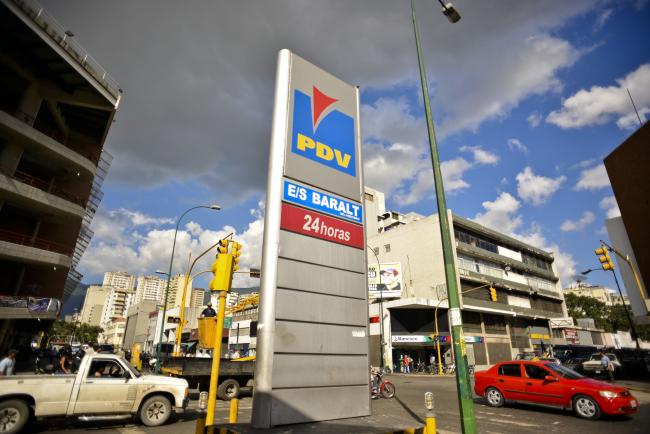(Bloomberg) -- Petroleos de Venezuela SA’s plan to make a $949 million bond payment would mark a rare exception for Nicolas Maduro’s regime as it tries to hold on to the crown jewel of its U.S. assets.
Venezuela’s state-run oil company is preparing to make the coupon and partial principal repayment that’s due Oct. 29 on the 2020 notes, according to a person with direct knowledge of the matter. The socialist state is behind on almost $7 billion in debt payments owed to investors, but this bond is backed by a majority stake in Citgo Holding Inc., meaning a non-payment would allow holders to lay claim to that asset.
The payment has been anticipated by investors. The $2.5 billion of notes traded as high as 92.75 cents on the dollar this week, far above most Venezuelan bonds, which hover near 25 cents. Analysts from JPMorgan Chase & Co (NYSE:JPM)., Torino Capital and Eurasia Group have also said the Maduro government would pay because of its desire to hold on to Citgo, although there are doubts about how much longer PDVSA can service the debt.
“The government’s strategy with regards to various creditor obligations seems to be to avoid or delay paying wherever possible but pay or settle when valuable external assets are in jeopardy," Risa Grais-Targow, a senior analyst at Eurasia Group, wrote in a note Monday. "There are limits to this strategy, as the government still faces meaningful cashflow constraints owing to declining cash-generating oil exports."
Calls and emails seeking comment from PDVSA´s vice president of finance, Iris Medina Fernandez, weren’t returned. A representative for Venezuela’s oil ministry declined to comment. The person with knowledge of the situation asked not to be named because the matter is private.
Even with the payment, Citgo’s fate remains in flux. The 2020 notes fell by the most in nearly two months on Wednesday amid a broader sell-off across risky assets. Here are some of the other hurdles that Venezuela needs to navigate to maintain ownership of the company:
- Citgo Petroleum and its parent Citgo Holding have more than $3 billion of their own debt outstanding. At least some of that might need to be repaid if the company changes ownership through a foreclosure or a sale.
- PDVSA pledged a 49.9 percent stake in Citgo Holding as collateral for loans it received from Rosneft in 2016. If it defaults on those loans, the Russian state-controlled oil company could seek to seize the shares.
- A small Canadian mining company, Crystallex International Corp., was awarded the right to collect on an arbitration award by taking shares of PDV Holding (the U.S. parent of Citgo Holding), a verdict Venezuela is appealing.
- PDVSA is due to pay $500 million to ConocoPhillips (NYSE:COP) in November as the first installment of a $2 billion settlement the two companies reached this summer. If it misses the payment, Conoco could seek to attach PDVSA assets, including Citgo.
- Separately, an $8 billion bondholder group advised by Guggenheim Securities has said it’s “exploring options” to ensure that the nation’s overseas assets are available to satisfy its claims.
So far, PDVSA has shown it is determined to hold on to Citgo, even as U.S. sanctions prevent the refiner from distributing dividends back to Venezuela. Citgo plays a key role in facilitating the export of Venezuelan crude -- the country’s main source of foreign exchange -- and also provides Venezuela with much-needed refined products.
“It is not about the value of the equity, which may not be much,” said Richard Cooper, a partner at law firm Cleary Gottlieb Steen & Hamilton LLC, who has advised holders of Venezuela’s debt. “Citgo remains an incredibly important asset for PDVSA.”
